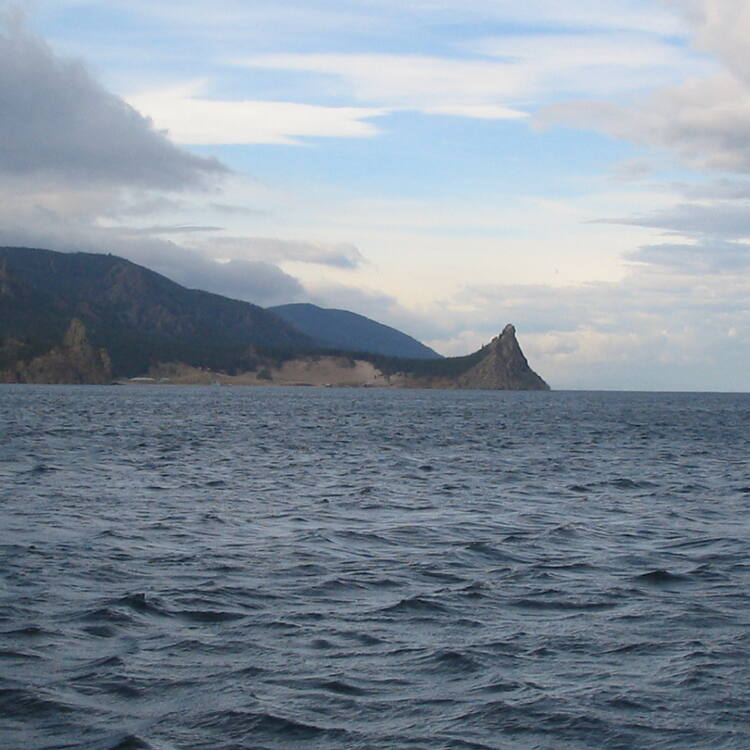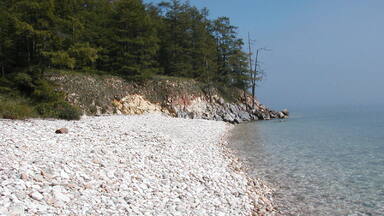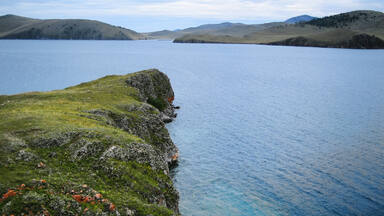Lake Baikal
Lake Baikal
Situated in south-east Siberia, the 3.15-million-ha Lake Baikal is the oldest (25 million years) and deepest (1,700 m) lake in the world. It contains 20% of the world's total unfrozen freshwater reserve. Known as the 'Galapagos of Russia', its age and isolation have produced one of the world's richest and most unusual freshwater faunas, which is of exceptional value to evolutionary science.
Description is available under license CC-BY-SA IGO 3.0
Lac Baïkal
Situé au sud-est de la Sibérie, le lac Baïkal, d'une superficie de 3,15 millions d'hectares, est le plus ancien (25 millions d'années) et le plus profond (1 700 m) lac du monde. Il contient 20 % des eaux douces non gelées de la planète. Son ancienneté et son isolement ont produit une des faunes d'eau douce les plus riches et originales de la planète, qui présente une valeur exceptionnelle pour la science de l'évolution, ce qui lui vaut le surnom de « Galápagos de la Russie ».
Description is available under license CC-BY-SA IGO 3.0
بحيرة بايكل
تقع بحيرة بايكل جنوب شرق سيبيريا وتمتد على مساحة3.15 مليون هكتار وهي أقدم بحيرات العالم (25 مليون سنة) وأعمقها (1700 متر). وهي تضمّ 20% من مياه الأرض العذبة غير المثلجة. وفي قدمها وعزلتها ما أفضى إلى تكوّن مجموعات حيوانيّة هي الأغنى والأكثر ابتكاراً على وجه الأرض وهي تتمتع بقيمة استثنائيّة لعلم التطوّر فكسبت اسم "غالاباغوس روسيا".
source: UNESCO/CPE
Description is available under license CC-BY-SA IGO 3.0
贝加尔湖
坐落在俄罗斯联邦境内西伯利亚东南部的贝加尔湖,占地315万公顷,是世界历史最悠久(2500万年)且最深的(1700米)湖泊。它拥有地表不冻淡水资源的20%。以“俄国的加拉帕戈斯”而闻名于世的贝加尔湖,因其悠久的年代和人迹罕见,使它成为拥有世界上种类最多和最稀有的淡水动物群的地区之一,而这一动物群对于进化科学具有不可估量的价值。
source: UNESCO/CPE
Description is available under license CC-BY-SA IGO 3.0
Озеро Байкал
Расположенный на юго-востоке Сибири и занимающий площадь 3,15 млн. га, Байкал признан самым древним (25 млн. лет) и самым глубоким (около 1700 м) озером планеты. Водоем хранит примерно 20% всех мировых запасов пресной воды. В озере, которое известно как «Галапагосы России», благодаря древнему возрасту и изоляции сформировалась уникальная даже по мировым меркам пресноводная экосистема, изучение которой имеет непреходящее значение для понимания эволюции жизни на Земле.
source: UNESCO/CPE
Description is available under license CC-BY-SA IGO 3.0
Lago Baikal
Situado al sudeste de Siberia, este lago tiene una superficie de 3.150.000 hectáreas y es el más antiguo (25 millones de años) y profundo del mundo (1.700 metros). Contiene el 20% del agua dulce no helada de la Tierra. Debido a su antigüedad y aislamiento posee una de las faunas de agua dulce más ricas y singulares del planeta. El excepcional interés que ésta ofrece para el estudio de la evolución de las especies le ha valido al lago Baikal el sobrenombre de “las Galápagos de Rusia”.
source: UNESCO/CPE
Description is available under license CC-BY-SA IGO 3.0
バイカル湖
バイカル湖は、世界で最も古く(2500万年前)最も深い(1700m)湖であり、世界の陸水の20%を保有している。約1000種の水棲生物や、海洋から離れているにもかかわらずバイカルアザラシなど隔離された種がみられ、ロシアのガラパゴスとも呼ばれる。(湖岸一帯は見事なタイガに覆われ、クロテン、シベリア赤シカなど貴重な動物の生息地になっている。)source: NFUAJ
Baikal meer
Het 3,15 miljoen hectare grote Baikal meer is het oudste (25 miljoen jaar oud) en diepste (1.700 meter) meer ter wereld. Het bevat 20% van 's werelds (niet bevroren) zoetwaterreserve. Het meer in zuidoost Siberië – de ‘Galapagos van Rusland’ – heeft een van de rijkste en meest ongewone zoetwaterfauna's ter wereld. Een van de meest opvallende soorten is de Baikal zeehond. Het gebied kent verder een grote verscheidenheid aan planten, waarvan een aantal inheems. Ten westen van het meer zijn er lichte naaldbossen en bergsteppen. In het gebied ten oosten domineren dennen- en loofbossen.
Source: unesco.nl
Justification for Inscription
The Committee inscribed Lake Baikal as the most outstanding example of a freshwater ecosystem on the basis of natural criteria (vii), (viii), (ix) and (x). It is the oldest and deepest of the world´s lakes containing nearly 20% of the world´s unfrozen freshwater reserve. The lake contains an outstanding variety of endemic flora and fauna, which is of exceptional value to evolutionary science. It is also surrounded by a system of protected areas that have high scenic and other natural values. The Committee took note of the confirmation of the revised boundaries of the site, which correspond to the core areas defined in the Baikal Law (excluding the five urban developed areas). It also noted that the special Lake Baikal Law is now in its second reading in the Duma. Finally, it noted concern over a number of integrity issues including pollution, which should be brought to the attention of the Russian authorities.


